Euro 2020: Scotland v England at Euro 1996 and what life was like then
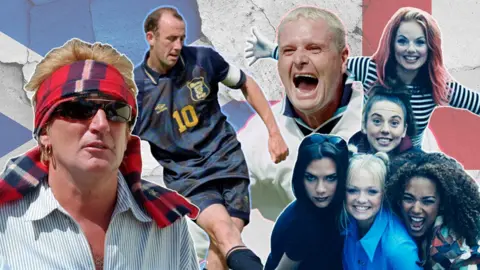 Getty Images
Getty ImagesIt was the summer of '96.
That was the last time England and Scotland men's teams were drawn against each other at a major tournament - pretty much 25 years ago to the day.
It was on home turf at the old Wembley stadium for England, as tournament hosts, and Scotland were out to spoil the party.
Much has been written about that game, which ended 2-0 to England.
Off the pitch, the world looked very different to today.
Oasis, Blur, and Cool Britannia
Britain was feeling good about itself in the peak of "Cool Britannia".
British 1960s-inspired culture was at the centre of the world stage and the Union Jack flag was all over pop culture and fashion.
Half the country's magazines seemed to have the likes of Kate Moss or Naomi Campbell on their covers - with the other half covering the fierce rivalry between Oasis and Blur.
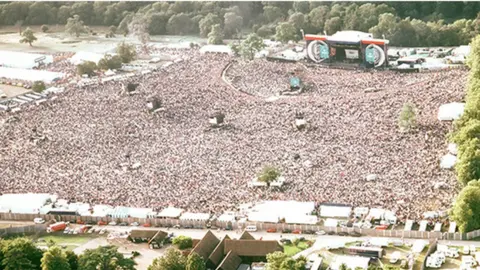 Getty Images
Getty ImagesThat August, Oasis would play to record-breaking crowds at Knebworth - with 250,000 people seeing the band at the height of their fame over two nights.
Boy bands and girl bands were also big business.
In 1996 Take That took a break after Robbie Williams quit the band, but it was also the year Girl Power really took off.
The Spice Girls released debut single Wannabe, which stayed at the top of the charts for seven weeks in total and launched the biggest girl band in the world.
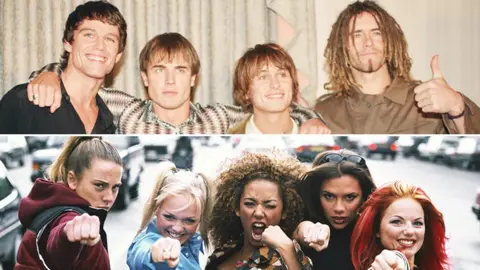 Getty Images
Getty ImagesWe can't talk about music without mentioning a song still sung by England fans today.
And it was at the Scotland v England Euro 1996 game when the English part of the crowd sang "football's coming home" for the first time.
Frank Skinner, one of the writers of Three Lions, was at the stadium for the match.
"We'd just won 2-0. As they were exchanging shirts at the end, they played it over the loud speaker, and I thought 'great'," he told Desert Island Discs.
"And then the crowd really really sang it. That was when I knew we'd got something special."
A music legend who was also in the crowd that day, wearing a tartan scarf, was behind Scotland's official song.
Rod Stewart sung of wild mountain thyme and cool crystal waters in the traditional song, Purple Heather.
This version of the love letter to Scotland also featured the Scotland squad on it.
What else was going on in 1996?
Some things never change - the royals were in the news.
There were two big splits in the family that year.
Prince Charles and Princess Diana had been separated since 1992, but it was in the summer of 1996 that their divorce went through.
The divorce of the Duke and Duchess of York - Prince Andrew and Sarah Ferguson - had been finalised a couple of months earlier.
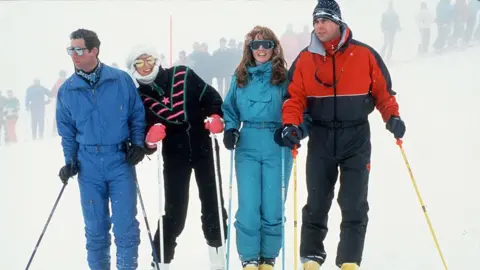 Getty Images
Getty ImagesThe country was going through an epidemic, too.
BSE - better known as mad cow disease - had peaked in the early 90s, but was still very much in the news.
The disease was deadly in cows and infected a small number of humans.
It put a lot of people off their burgers and had huge impacts on the farming industry.
In spring 1996, a three-year ban on the UK exporting British beef was brought in by the European Commission.
To try to stop the disease, 4.4 million cattle were slaughtered.
In other animal news, a sheep became a worldwide celebrity.
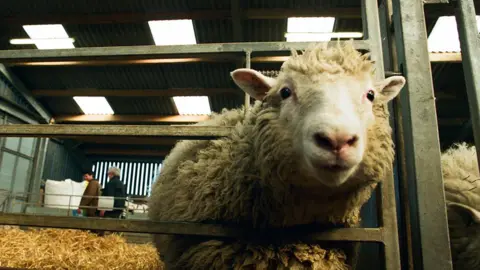 Getty Images
Getty ImagesThat's because she was the first mammal to have been successfully cloned from an adult cell.
Dolly the sheep was cloned by scientists from the University of Edinburgh in July 1996, although they didn't reveal their results until seven months later.
In comments that you really wouldn't hear in 2021, the head scientist revealed the thinking behind the sheep's name: "Dolly is derived from a mammary [milk-producing] gland cell and we couldn't think of a more impressive pair of glands than Dolly Parton's."
There were also tragic events which overshadowed the year.
The mass shooting of 16 children and their teacher in Dunblane remains the worst firearms atrocity in the UK.
It led to a massive campaign to tighten the UK's gun laws.
Crimes involving firearms have fallen by two-thirds in Scotland since Dunblane, government figures suggest.
It was also the year an IRA bomb left outside Manchester's Arndale shopping centre injured hundreds of people. It happened the same day England and Scotland met on the pitch.
The bomb was the biggest detonated in the UK since World War Two.
No one has ever been charged, but Manchester police recently said a review of evidence produced "new, albeit limited, investigative opportunities" into the attack.
What happened on the pitch?
Scotland came into the match off the back of an impressive goalless draw with the Netherlands, while England had played out a disappointing 1-1 with Switzerland in their first game.
It took until the 53rd minute for England's Alan Shearer to break the deadlock with a header.
But it was a two-minute window toward the end of the match which finished it off.
Scotland won a penalty on 77 minutes, and up stepped midfielder Gary McAllister.
Somehow, the ball moved as he took his run up - and although he still struck it cleanly, the spot kick was saved.
England fans have goalkeeper David Seaman to thank - or should they be thanking spoon-bending self-professed psychic Uri Geller instead?
He claims he was hovering above Wembley in a helicopter, and it was his mind trick which caused the ball to move.
Not even Uri can take credit for the moment of magic which followed, though.
Within 90 seconds of the penalty, Paul Gascoigne scored one of the most famous England goals ever.
The bleach-blond magician flicked the ball over Scotland's Colin Hendry, caught it on the volley and buried it in the bottom corner.
And his "dentist's chair" celebration is just as famous as the goal.
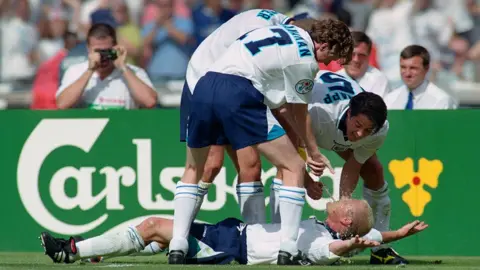 Getty Images
Getty ImagesUp until that point in the match, Scotland looked like they had a way back into the match - but at 2-0 it was game over.
Both teams would go on to win their next games, but it was heartbreak for Scotland as they went out on goal difference.
England would make it to the semi-final before going out to Germany - on penalties, of course.
It was Gareth Southgate who missed the crucial kick.
A quarter of a century later, and the old rivals will square up again.
Who knows what will happen on Friday night - but that Saturday afternoon in 1996 will live on forever in the minds of fans on both sides of the border.

